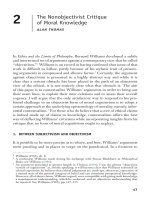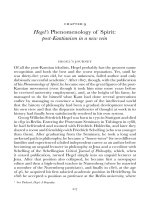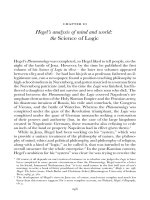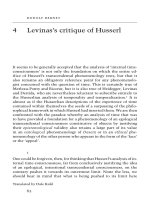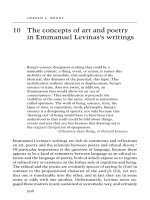Levinas’s critique of Husserl
Bạn đang xem bản rút gọn của tài liệu. Xem và tải ngay bản đầy đủ của tài liệu tại đây (143.93 KB, 18 trang )
rudolf bernet
4 Levinas’s critique of Husserl
It seems to be generally accepted that the analysis of ‘internal time-
consciousness’ is not only the foundation on which the entire ed-
ifice of Husserl’s transcendental phenomenology rests, but that it
also remains an obligatory reference point for any phenomenolo-
gist concerned with the question of time. This is certainly true of
Merleau-Ponty and Ricœur, but it is also true of Heidegger, Levinas
and Derrida, who are nevertheless reluctant to subscribe
entirely to
the Husserlian analysis of temporality and temporalization.
1
It is
almost as if the Husserlian descriptions of the experience of time
contained within themselves the seeds of a surpassing of the philo-
sophical frameworkin which Husserl had inserted them. We are then
confronted with the paradox whereby an analysis of time that was
to have provided a foundation for a phenomenology of an egological
transcendental consciousness constitutive of objects by justifying
their epistemological validity also retains a large part of its value
in an ontological phenomenology of Dasein or in an ethical phe-
nomenology of the other person who appears in the form of the ‘face’
or the ‘appeal’.
i
One could be forgiven, then, for thinking that Husserl’s analysis of in-
ternal time-consciousness, far from conclusively justifying the idea
of an egological, intentional transcendental consciousness, on the
contrary pushes it towards its outermost limit. None the less, we
should bear in mind that what is being pushed to its limit here
Translated by Dale Kidd
82
Levinas’s critique of Husserl 83
should not be confused with consciousness as understood by late
nineteenth-century psychology (however much it inspired Husserl),
nor with the transcendental in the neo-Kantian sense. The charac-
terization of Husserlian phenomenology as a ‘transcendental empiri-
cism’ is a perfect acknowledgement of this double difference.
By essentially distinguishing transcendental consciousness from
any empirical consciousness, Husserl’s phenomenology overcomes
the aporias of psychologism, and this for two principal reasons:
(1) the objects of consciousness are intentional objects which, in-
stead of belonging to consciousness as its constitutive moments,
are on the contrary recognized in their transcendence and ideality;
(2) the intentional consciousness which is directed to these objects is
a consciousness purified of all empirical apperception. By purifying
consciousness of its apperception as a psychophysical fact, the phe-
nomenological reduction at the same time safeguards the transcen-
dence of the intentional object. As a consequence, transcendental
phenomenology is devoted to a study
of the correlation between
the acts of a pure consciousness and noematic objects, i.e. objects
just in so far as they are aimed at by such acts. By investigating ob-
jects as correlates of the acts of a pure consciousness, transcendental
phenomenology deprives them of their autonomy, of their indepen-
dence with respect to consciousness, but it does not deprive them
of their transcendence. Their transcendence is preserved not only
because the object of a punctual intentional act is not itself a con-
stitutive part of that act, but also because various acts succeeding
one another in time can still relate to the unity of one and the same
object.
While Husserl’s transcendental phenomenology is distinguished
from the empirical psychology of its day both by its safeguarding
the transcendence of the intentional object as well as by the tran-
scendental purity of the consciousness that it studies, this does not
mean that it should be confused with the transcendental philosophy
of the Marburg school (the form of neo-Kantianism to which it is
closest). The famous correspondence between Husserl and Natorp
is a particularly telling testimony to this difference. Transcendental
phenomenology does not rest on the unquestioned validity of scien-
tific objects and works its way back, in the form of a ‘reconstruction’,
to subjective spirit as their formal condition of possibility. On
the contrary, it is immediately and exclusively interested in the
84 the cambridge companion to levinas
transcendental subject’s effective life, and in the way in which (scien-
tific and natural) objects are ‘given’ or are presented as ‘phenomena’
to the transcendental subject. In this way, the transcendental
acquires an ‘empirical’ value, in the sense that phenomenology stud-
ies the particular content of an experience, primarily its sensible
content. For transcendental phenomenology, the experience that is
constitutive of intentional objects is perceptual or pre-predicative be-
fore it is an experience of thought or judgement. Yet the fact that this
experience or consciousness is the object of a transcendental science
in no way implies that it is considered as simply the formal or logi-
cal possibility condition for the validity of objects of experience. The
source of validity for these objects is not provided by the ‘principles’
(Grunds
¨
atze) of the understanding, but by the effective life of a pure
intentional consciousness within which objects are given and con-
stituted as transcendent unities. In this way, transcendental phe-
nomenology brings to appearance an effective transcendental life,
which underlies empirical life as its
hidden foundation. Contrary to
neo-Kantianism, the transcendental for Husserl is a specific mode
of life with its own mode of appearing, in which sensibility plays a
privileged role.
We must now askwhat place a transcendental phenomenology
of constituting consciousness will reserve for the phenomenon of
temporality, and in what forms this phenomenon will be given. It
cannot but occupy a central place, since transcendental conscious-
ness is a life that is constantly evolving, and its realizations are
temporal events. It is not for no reason
that Husserl speaks of the
‘flux’ (Fluss) of consciousness. The rhythm of this flux is articulated
by the emergence of a new intentional act succeeding the previous
one, which is thus pushed into the past. In most cases, this new act
is not without links to the previous act; it was already present in
the form of an anticipated future before being effectively realized in
the present. And what is true of the act in its temporal duration is
equally true of each instant within this duration: consciousness of
the present is always intertwined with consciousness of the past and
of the future, and this is the very reason why consciousness is a flux
and not a succession of separate punctual instants. We should there-
fore bear in mind that, for Husserl, even before time is related to
objects, it already characterizes transcendental consciousness itself
in its effective accomplishment. The being of transcendental life is
Levinas’s critique of Husserl 85
the incessant movement of its own self-temporalization. We should
also bear in mind that this process of self-temporalization is articu-
lated by the indefinitely renewed emergence of a new presence or a
new present.
Having thus established the fundamentally temporal character of
the life of intentional constituting consciousness, Husserl’s inves-
tigations then proceed in two opposing directions. The first is an
interrogation of the way in which the temporality of intentional
consciousness constitutes the temporal determinations of objects
and, more generally, the objective time of the world as the hori-
zon in which empirical objects manifest themselves. It is a ques-
tion of understanding how, in the incessant movement of inten-
tional life, the immutable identity of a temporal order is constructed
in which each object or event is assigned its own place, once and
for all, with respect to all other contemporary, prior or posterior
objects or events. In particular, Husserl shows that rememorative
re-presentation (wiedererinnernde Vergegenw
¨
artigung) plays a cru-
cial role in this process. The second direction, by contrast, leads to-
wards an investigation of that ultimate or ‘absolute’ consciousness
in which, or for which, the flowing temporality of intentional acts
appears. This ultimate consciousness turns out to be the ‘inner’ con-
sciousness that accompanies the temporal accomplishment of inten-
tional acts as its shadow or, more precisely, as its own specific mode
of manifestation. The flowing temporality of the intentional acts of
constituting consciousness appears in a way that is fundamentally
different from the way in which the fixed temporal features of con-
stituted objects appear. The appearance of the flowing temporality
of intentional acts is no longer a matter of rememoration and a syn-
thesis of recognition, it is a matter of sensibility, of the intimacy
of an immediate ‘feeling’ (Empfindnis) that is an auto-affection of
consciousness by itself. It should also be mentioned that the flux
of absolute consciousness within which the flowing temporality of
intentional acts appears, at the same time appears to itself in the form
of a ‘retentional’ auto-affection. This ‘longitudinal intentionality’ of
retention explains what one could call the ‘ageing’ of the present:
it is a reserve whose ‘freshness’ grows dim and then ‘dies’, and
whose possible ‘resurrection’ hinges on the advent of an ‘awakening’
which takes place by virtue of an associative link with a novelty that
resembles it.
86 the cambridge companion to levinas
ii
This edifice formed by the Husserlian analysis of time-
consciousness, whose outlines we have just described, has been the
object of various sorts of criticism. Those formulated by Heidegger
are undoubtedly the best known, and they have found the great-
est echo among the thinkers of the phenomenological movement.
For example, Heidegger accuses Husserl of limiting himself to a
phenomenological clarification of the consciousness of time, and of
overlooking time as an originary accomplishment of transcendence.
Heidegger also believes that this consciousness of time always has
the form of an intentional consciousness, and he concludes from
this that Husserl’s analysis of temporality is only concerned with
time as an object of theoretical knowledge. This purely theoretical
approach to time is also held responsible for the exorbitant privi-
lege granted to the present time and to the presence of beings in the
mode of Vorhandenheit. This double reproach that Heidegger directs
at Husserl contains, in an embryonic form, the entire project of Sein
und Zeit. Was it not the intention of ‘fundamental ontology’ to ar-
rive at a new understanding of the temporal meaning of being by
examining the way in which Dasein, in the effective accomplish-
ment of a life governed by care, understands the temporal meaning
of its own existence? By moving from Husserl to Heidegger, then, the
phenomenological analysis of temporality undergoes a shift towards
ontological preoccupations concerned in the first place with human
existence and, more specifically, with its most significant moments,
such as death.
2
The criticisms
that Levinas addresses to Husserl
’s comprehension
of temporality are more difficult to delimit, for although they are
sometimes inspired by Heidegger, they often turn against Heidegger
and end up by at least partially rehabilitating Husserl. This decep-
tive appearance of an oscillation between Husserl and Heidegger can
be explained primarily by the fact that Levinas essentially shares
neither the epistemological preoccupations of Husserl nor the on-
tological preoccupations of Heidegger. Even before he raised ethics
to the rankof first philosophy, Levinas had already exhibited in
his first writings on time a particular attention to the question of
alterity. In his debate with Husserl and Heidegger about the ques-
tion of the other (aliud) at the heart of the sameness of my experience
Levinas’s critique of Husserl 87
of time, it is already always the other person (alter) that Levinas is
aiming at.
Before proceeding to examine his analysis of the other person’s
appearance at the heart of this temporalization which is the funda-
mental mode in which my existence is accomplished, let us pause
and lookmore closely at the objections Levinas formulates against
the Husserlian analysis of temporality. It will quickly become clear
that all of these accusations are directed to the analysis of tempo-
rality within the frameworkof intentional consciousness, and that
everything Husserl says about temporality as a mode in which sen-
sibility is accomplished will be spared.
The first objection has to do with the exclusively theoretical char-
acter of the Husserlian analysis of temporality, and here Levinas re-
iterates Heidegger’s criticisms, without, however, subscribing to the
Heideggerian conception of practical care. According to Levinas, the
transcendence of care is not any less egocentric than the intentional-
ity of representational consciousness.
An intentional consciousness
that opposes itself to an object the better to dominate and appro-
priate it, and a Dasein that is preoccupied with things by utilizing
them for its own designs are both, for Levinas, afflicted with the
same inability to do justice to the alterity of what they are related to.
They are both inscribed within the same logic of power, assimilation
and enjoyment which ends up by stripping things of their autonomy
and hence their reality. The temporal sense of Husserl’s intentional
consciousness and Heidegger’s care would then consist of unfolding
around oneself a horizon of possibilities
of one’s own life, to which
things are required to conform if they want to enjoy the right to ap-
pear and to acquire a meaning. What is true of things is also true of
other persons when one deals with them in the mode of intentional
consciousness or care: they become either an other constituted by me
or an other whom I make into my partner in view of a common task.
The second objection Levinas formulates to the Husserlian anal-
ysis of temporality tends in the same direction and is once again
addressed to Heidegger as well. Levinas accuses both of them of de-
veloping an understanding of temporality that does not take suf-
ficient account of novelty, unpredictability and impossibility. For
Husserl, the event in which a new present suddenly emerges is under-
stood as the fulfilment of a preceding anticipatory intention, which
means that the new is never truly new. At first sight, the same
88 the cambridge companion to levinas
objection could not be made to Heidegger, who carefully distin-
guishes Vorlaufen from anticipation and who specifies that the death
to which this Vorlaufen is related belongs to the order of the impos-
sible. To which Levinas replies that, for Heidegger, death is still the
possibility of an impossibility, not the impossibility of every pos-
sibility. It is clear that, for Levinas, what is at issue in the novelty
of the present and, in a death that takes away our power of possibi-
lization, is the alterity of an event that unexpectedly strikes us and
that places us in a position of impotent passivity. The temporality
of the new, i.e. that which interrupts and tears apart the continuity
of my life, is a temporalization that comes to me from the outside.
The same can be said of the event of death, which determines the
temporality of my life in a way that is just as constraining, without
my being either author or actor.
The third objection that Levinas levels against the Husserlian
conception of time has to do with yet another way of mistaking
the role of alterity in the self-temporalization
of intentional con-
sciousness. Contrary to what has been said about the dominating,
egoistic power of intentional consciousness and care in their in-
teraction with things and with persons, and contrary to what has
just been said about the failure to acknowledge the novelty of the
present and the impossibility of the future, this third objection –
which is still of a Heideggerian inspiration – can no longer be turned
against Heidegger. What is now being questioned in Husserl is the
‘re-presentation’ (Vergegenw
¨
artigung)ofthepast in ‘rememoration’
(Wiedererinnerung). The Husserlian analysis of memory is primar-
ily concerned with assuring continuity between the present and the
past: the originary meaning of the past is determined by my elapsed
intentional lived experiences, and because all of these experiences
are ‘retained’ by my present consciousness in their original fluidity,
they can for that reason be made present again at any moment in the
form of a memory. For Husserl, then, the past is a displaced present,
pushed backfrom the centre of present consciousness towards its pe-
riphery by the emergence of a new lived experience. For Levinas, this
conception of the past is unable to do justice to its alterity, which
has to do with temporal distance, interruption and loss. While it
does not really deny the difference between the present and the past,
Husserl’s conception of retention and rememorative representation
is nevertheless an effort to ‘recuperate’ the past, by re-establishing or

